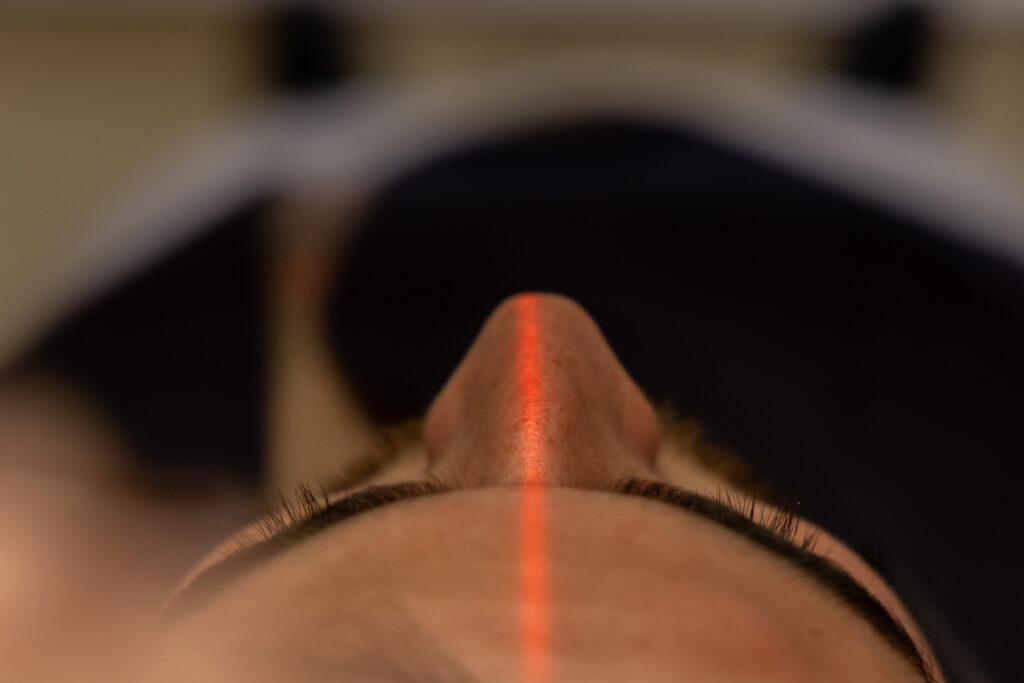Multidetector CT
What is Multidetector CT?
Multidetector CT (multidetector computed tomography), also known as multislice CT, is an imaging technique that uses X-rays to obtain detailed cross-sectional images of the body. Unlike conventional CT scans, multidetector CT uses multiple rows of detectors, allowing images to be acquired faster and with higher resolution. This translates into shorter scans, lower radiation dose, and the ability to obtain high-quality three-dimensional images.
What is this diagnostic test used for?
Multidetector CT is used for a wide variety of purposes, including:
- Diagnosis of diseases: Allows for diagnosing diseases in almost all parts of the body, including the brain, chest, abdomen, pelvis, and extremities.
- Treatment planning: Helps plan medical and surgical treatments, providing detailed information about the anatomy and extent of the disease.
- Procedure guidance: Can be used to guide interventional procedures, such as biopsies and drainages.
- Detection of lesions: allows for detecting lesions, such as tumors, fractures, hemorrhages, and infections.
- Trauma evaluation: it is a fundamental tool in the evaluation of patients with trauma, allowing for rapid identification of internal injuries.
Benefits of high technology in Multidetector CT
Multidetector CT offers a series of key benefits thanks to the technology it uses:
- Increased speed: Allows for faster image acquisition than conventional CT scans, which reduces scan duration and the need for the patient to remain still.
- Higher resolution: Provides images with higher resolution, allowing for better visualization of anatomical structures and detection of small lesions.
- Lower radiation dose: Allows for reducing the radiation dose compared to conventional CT scans.
- Three-dimensional imaging: Allows for obtaining high-quality three-dimensional images, which facilitates the visualization and interpretation of images.

How is the procedure performed?
The multidetector CT procedure generally proceeds as follows:
-
Preparation:
Preparation varies depending on the area of the body to be scanned and whether contrast medium will be used. In general, you will be asked to fast for at least 4 hours before the test if contrast medium will be used. It is important to inform your doctor about any allergies you have and about all medications you are taking, including over-the-counter drugs and supplements.
-
During the test:
You will lie on a table that slides into the CT scanner. An intravenous line will be placed in your arm if contrast medium will be used. You will be asked to remain calm and hold your breath briefly during image acquisition.
-
After the test:
You can resume your usual activities immediately after the procedure. You will be advised to drink plenty of fluids to help eliminate the contrast medium from your body if it has been used.
Recommendations for the test
Remember that it is important to follow these recommendations to ensure the quality of the study and your comfort:
- Follow preparation instructions: Carefully follow all preparation instructions provided by your doctor or hospital staff.
- Inform about allergies and medications: It is important to inform your doctor about any allergies you have and about all medications you are taking, including over-the-counter drugs and supplements.
- Inform about pregnancy: If you are pregnant or think you might be, inform your doctor.
Are there any risks?
Multidetector CT is generally safe, but like any medical procedure involving radiation and, in some cases, contrast medium, it has some minimal risks to consider:
- Radiation exposure: Radiation exposure is low and considered safe. Your doctor will evaluate if the benefits outweigh the risks.
- Allergic reactions: In rare cases, allergic reactions to the contrast medium may occur.
- Kidney problems: The contrast medium can affect kidney function, especially in patients with pre-existing kidney disease.
For your test to proceed smoothly, we ask that you arrive in advance of your scheduled time. This will allow us to complete the necessary administrative and clinical preparation.
Before the test, we will provide you with the Informed Consent form, a document with important information that you must read and sign.
If your appointment is for a Magnetic Resonance Imaging (MRI), it is crucial that you inform us about the presence of pacemakers, metallic objects, prostheses (including dental), tattoos, or medication infusion devices, such as insulin pumps.
These diagnostic tests are very safe, but as with any medical procedure, there is a minimal possibility of incidence.